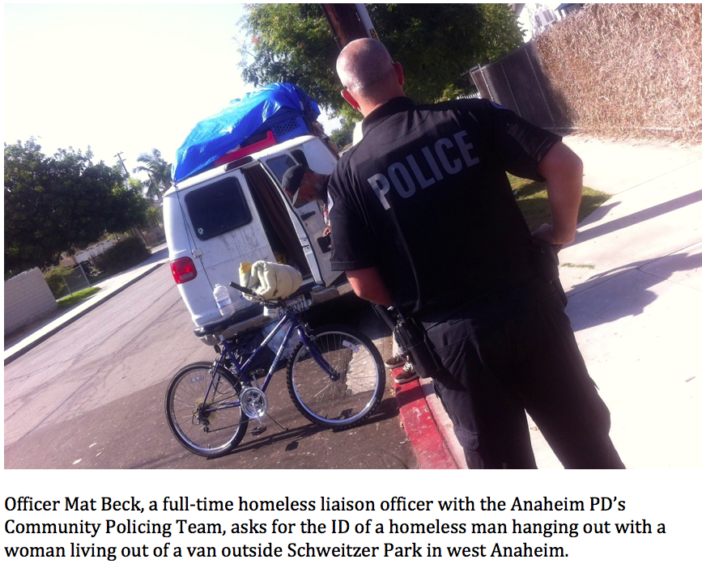Reduce homeless-related calls for service. Provide better assistance to the growing population. And improve safety and quality of life.
Those are among the goals of the Anaheim Police Department’s new approach to policing homeless people, which is reducing crime and calls for service by helping them get off the street.
APD’s strategy is highlighted this month on the FBI’s website.
“Many police officers encounter people daily who are in need of assistance, but they often do not have the means to provide that help,” wrote Lt. Steve Marcin.
By collaborating with nonprofits, churches, mental health experts and others, Anaheim police officers can “connect service providers to people who need aid and want to help themselves,” he wrote. “The result is improved humanitarian outreach, reduced number of homeless individuals, a grateful and safer community and fewer calls for service.”
In 2013, the police department averaged 503 homeless-related calls each month. In the first quarter of 2014 (after launching the new approach) the number dropped 13 percent.
Anaheim police also helped 215 people get off the street, Marcin wrote.
In Orange County, several agencies – including Fullerton, Huntington Beach, Garden Grove, Cypress and the Orange County Sheriff’s Department – employ a similar approach.
Supervised by a sergeant, the team includes a psychiatric emergency response team, a “Homeless Resource Collaborative” and homeless liaison police officers.
In Anaheim, police found mentally ill people need the most help. So the department partnered with the Orange County Health Care Agency. A mental-health clinician rides along with police officers, and they respond to calls together.
When not responding to calls, the team also engages people who sleep in public places or wander in or near traffic to see if they want help.
“Assistance comes in many forms,” Marcin wrote.
Sometimes it involves transportation to a caring family member or new clothing. Others need help with substance abuse. Anaheim has created partnerships with non-profits such as Coast to Coast Foundation, whose volunteers are available around the clock to help find a homeless person shelter or connect them with a loved one or other services.
Homeless liaison officers work every shift and carry backpacks with bus passes, meal and hotel vouchers, identification forms, hygiene kits. They also have access to local storage lockers that include umbrellas, blankets and more.
“Each homeless-related call for service represents an opportunity to help,” Marcin wrote.
Marcin acknowledged not everybody wants help, and enforcement is still a tool that Anaheim uses when necessary.
“Criminal behavior cannot be tolerated, and homeless individuals who violate the law must be held accountable,” he wrote, adding: “APD’s experience has been that arrest and prosecution are not as effective as other methods when attempting to remedy a person’s homeless situation and prevent future police contact.”
RELATED ARTICLES
APD’s new homeless team: ‘We’re here to help’
Homeless court coming to North Court
 Behind the Badge
Behind the Badge



